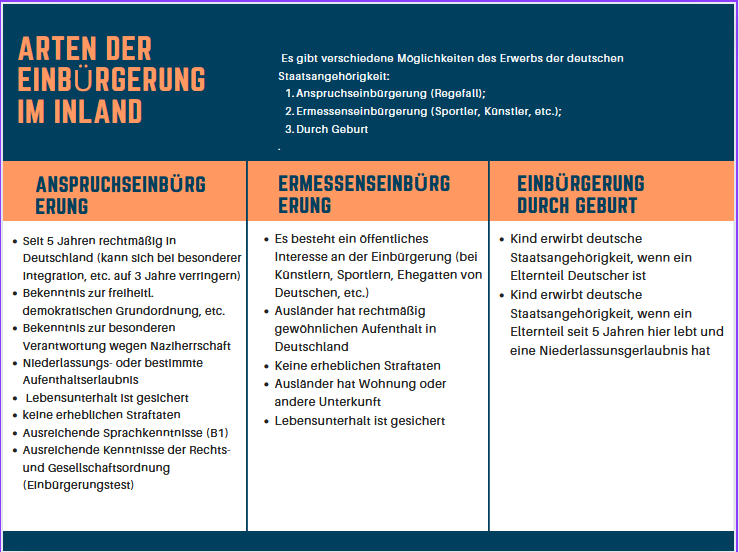Administrative Court of Munich, Judgment of May 11, 2023, Case No.: M 27 K 22.1811
Criminal offenses can prevent the naturalization of a foreigner. An application for naturalization is generally rejected if the foreigner’s criminal conviction exceeds the threshold of 90 daily rates under Section 12a(1) of the Nationality Act (StAG). However, must criminal investigations against the foreigner also be awaited until they are concluded? This was the issue in this case before the Administrative Court of Munich.
Facts of the Case:
Facts of the Case U.S. citizen applies for naturalization in Germany
The 62-year-old plaintiff was a U.S. citizen who had lived in Germany since the 1960s. The plaintiff held a permanent residence permit.
The plaintiff applied for a passport at the U.S. Consulate, but the application was denied due to allegations of fraud and failure to appear dating back to 1994. Subsequently, the plaintiff submitted a naturalization application to the local district office. In his application, he mentioned a stay in the USA from February 1988 to May 1988 and a criminal investigation initiated in 1988 in the USA on charges of fraud.
A criminal investigation for fraud was pending against him in the USA
The administrative procedure was repeatedly suspended, and the plaintiff attempted, through attorneys, to obtain evidence of the arrest warrant and the status of the investigation in the USA. The plaintiff received this information, which revealed that the charge was theft by deception or false representation under § 3922(a)(1) of Chapter 18 of the Consolidated Statutes of the U.S. state. The offense was classified as a third-degree felony, the lowest level of felony. The case was classified as „inactive.“ The maximum possible sentence for the alleged offense was seven years. The statute of limitations was not applicable.
Naturalization authority rejects the naturalization application due to the investigation
The defendant (naturalization authority) then rejected the plaintiff’s application for naturalization. The main reason given was that the requirements for naturalization under entitlement were not met. One of the requirements under Section 10(1)(5) of the StAG is that there must be no conviction for a criminal offense. Since the U.S. authorities had issued an arrest warrant against the plaintiff, the naturalization process had to be suspended under Section 12a(3) of the StAG until the criminal proceedings were concluded.
The plaintiff then filed a lawsuit with the Bavarian Administrative Court of Munich, seeking an order to compel the defendant to grant naturalization.
Judgment of the Administrative Court Munich
Judgment of the Administrative Court of Munich Court rules that the prerequisite is a „clean criminal record.“
The Administrative Court ruled that the plaintiff had no right to naturalization. Even though he had not been finally convicted, the decision on the naturalization application had to be suspended under Section 12a(3)(1) of the StAG.
Section 12a(3)(1) of the StAG also applies to foreign criminal investigations. A prerequisite for naturalization is generally a „clean criminal record.“
This was not expected given the ongoing investigation involving the plaintiff.
Thus, Section 12a(3)(1) of the StAG applied due to the outstanding arrest warrant in the USA and the related criminal proceedings. Consequently, under Section 12a(3)(1) of the StAG, the decision on the naturalization had to be suspended, though not the naturalization procedure itself.
Foreign convictions must be considered under Section 12a(2) of the StAG if (1) the offense is punishable in Germany, (2) the conviction was rendered in a legal proceeding, and (3) the sentence is proportionate.
The court found that the subject of the investigation would also be considered a punishable offense in Germany. The alleged theft by deception or false representation under § 3922(a)(1) of Chapter 18 of the Consolidated Statutes corresponds to theft under § 242(1) of the German Penal Code (StGB) or fraud under § 263(1) of the StGB.
The court in the USA was also considered a legal proceeding.
The plaintiff’s argument that his conviction in the USA would occur in an unlawful process was not substantiated. Notably, the mere fact that the statute of limitations would not apply in the plaintiff’s case after indictment and departure did not render the process unlawful.
There was also no indication of disproportionality in the (expected) sentence. The fact that a sentence of up to seven years could be imposed for a theft- or fraud-like offense (with a penalty range of up to five years under § 242(1) or § 263(1) of the StGB) did not suggest that the sentence would be unjust.
Therefore, the Administrative Court of Munich concluded that the plaintiff’s naturalization was currently not possible. https://www.mth-partner.de/auslaenderrecht-anwalt/einbuergerung-wann-fuehren-verurteilungen-zu-einer-straftat-zur-ablehnung-der-einbuergerung/

Important Note: The content of this article has been prepared to the best of our knowledge and belief. However, due to the complexity and constant evolution of the subject matter, we must exclude liability and warranty. Important Notice: The content of this article has been created to the best of our knowledge and understanding. However, due to the complexity and constant changes in the subject matter, we must exclude any liability and warranty.
If you need legal advice, please feel free to call us at 0221 - 80187670 or send us an email at or send an email to info@mth-partner.de info@mth-partner.de
Lawyers in Cologne advise and represent clients nationwide in immigration law.

